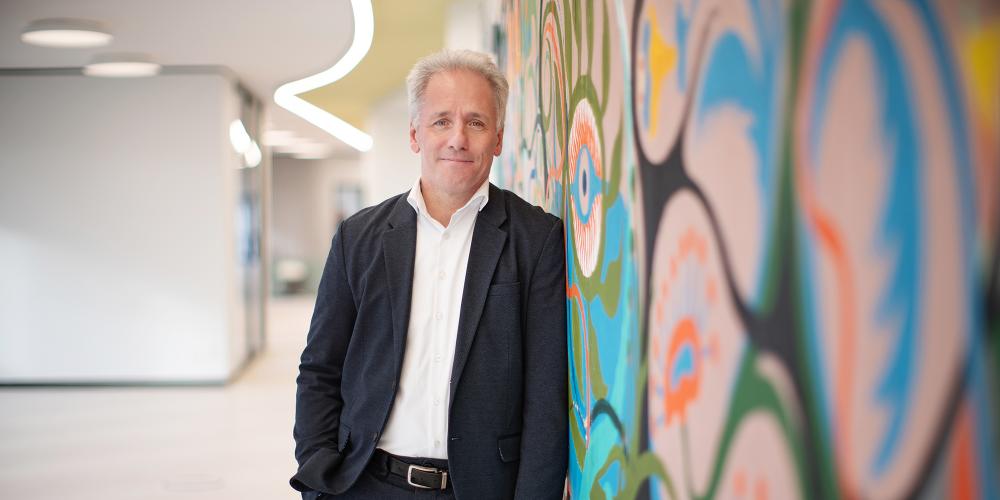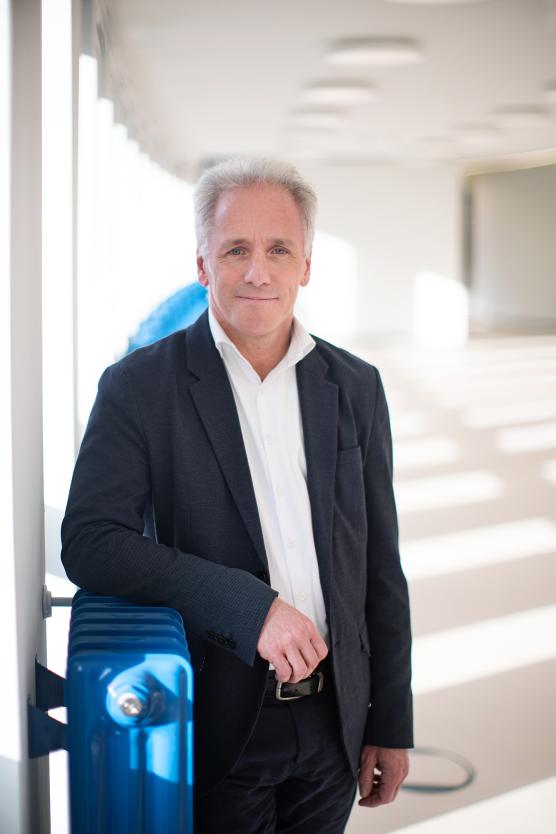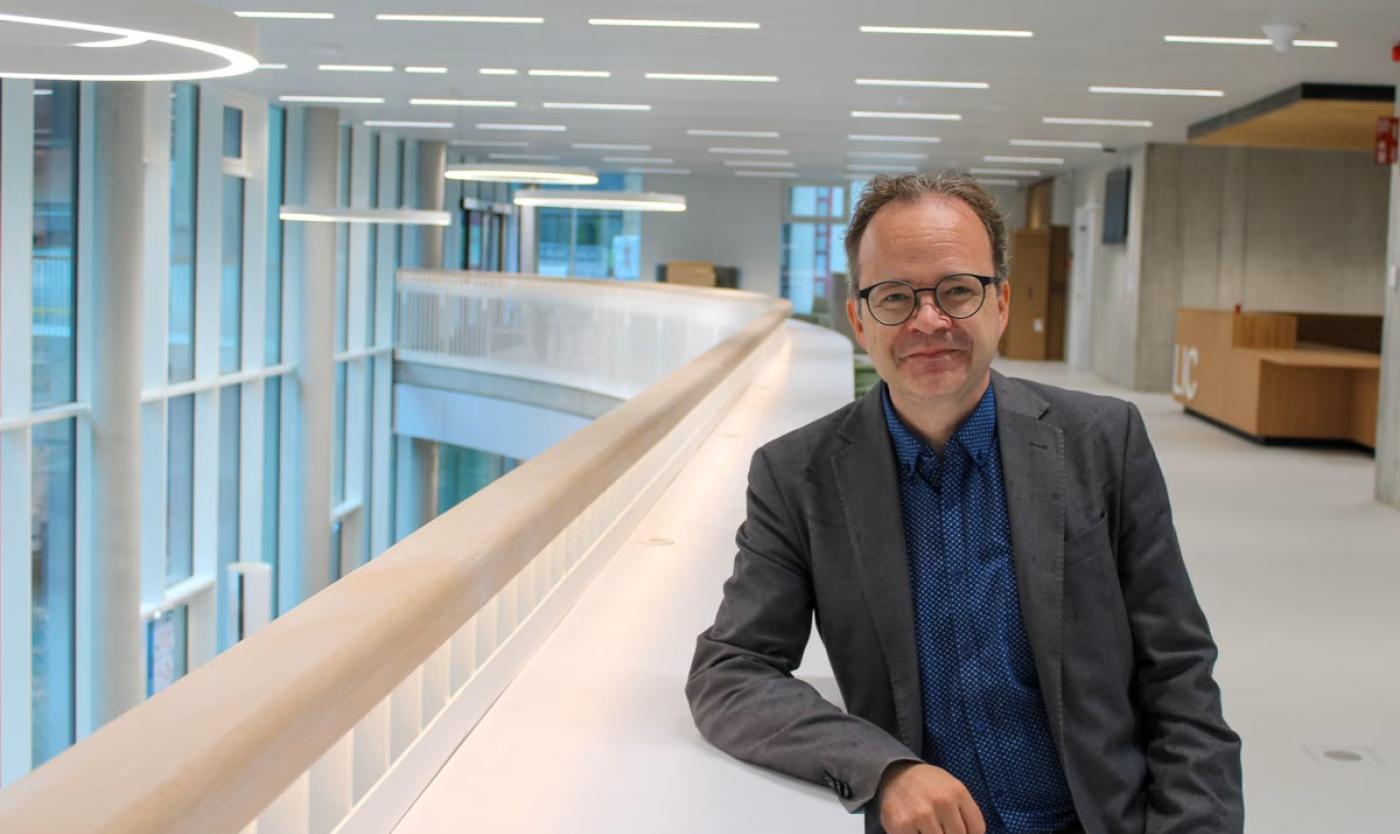
Universities are grappling with pressing issues in knowledge security, defence research, and cybersecurity. Where "open science" once reigned supreme, the focus has now shifted to "as open as possible, as secure as necessary." Peter Schelkens, the new Vice-Rector for Innovation at the Vrije Universiteit Brussel (VUB), is tasked with guiding researchers through this evolving landscape. Drawing on his extensive career in technology, interdisciplinary research, and innovation, Schelkens emphasises the societal responsibility of researchers. “Researchers must reflect more often on questions like: what are the consequences of my collaborations?”
Did your parents inspire your interest in science?
“Not really. I come from a teaching family: my father was a headmaster, and my mother, trained as a Dutch-English teacher, worked as a librarian. At home, we placed great value on reading and general knowledge, and we were encouraged to follow our interests. As a child, I loved reading. My parents didn’t push science on me—it was more a personal interest. I eagerly read popular science magazines like EOS and spent hours playing with Lego and Philips electronics experiment kits. In primary school, I even won second prize for designing a Lego crane—back then, such models didn’t come in pre-packaged kits. My interest in technology surfaced early on.”
Were you a typical nerd?
“Well, what exactly is a nerd? I’ve always been very sporty—mostly BMX and gymnastics in my youth. But at the same time, I was constantly tinkering with new technology. In secondary school, an uncle who taught biology and IT at a horticultural college in Vilvoorde would sometimes bring computers home during the holidays. I was allowed to use them, which was a thrill for me. He introduced me to programming, and that’s when my passion really ignited. I started writing small programs and sending them to computer magazines, some of which were published. By my final year of secondary school, I was proficient in several programming languages: Basic, Pascal, assembler, and a few operating systems. I’m especially grateful to Atheneum Willebroek for providing a solid grounding in science, which laid the foundation for my academic and professional journey.”
Did you want to become a scientist as a young man?
“In secondary school, I was interested in engineering, though I didn’t fully grasp what it entailed. I initially studied to become an industrial engineer in electronics at the Antwerp-Mechelen Industrial College, now part of the University of Antwerp. My master’s thesis was at Bell Labs, part of Alcatel-Lucent in Antwerp, where I developed an electronic component for amplifiers in mobile phones. Years later, my supervisor told me that my design was actually used in the first generation of GSMs. Alcatel-Lucent was the pioneer of commercial mobile phones. Nowadays, that seems amazing—everyone has a mobile! But back then, I thought, a phone you can carry around? So what?
"I’m interested in many things—it’s both a strength and a weakness"
“That thesis got me thinking: I wanted deeper scientific and mathematical knowledge. So I switched to studying civil engineering, but not before completing mandatory military service, which was still required at the time. I volunteered as a candidate reserve officer to make the experience more meaningful. Despite being very fit from my sports activities, I was rejected because of a significant childhood operation. Looking back, it was a blessing in disguise; otherwise, I might not have continued my studies. My life seems to be a series of decisions that might appear naïve but were always driven by my interests or sense of responsibility. Fortunately, they’ve worked out well.
The condensed civil engineering programme at VUB took three years. I wanted to broaden my specialisation beyond chip design, so I chose applied physics. One of my lecturers was Hugo Thienpont, my predecessor, who taught photonics—a budding discipline at the time. Alongside civil engineering, I also completed a postgraduate course in biomedical engineering, specialising in medical physics. These three programmes gave me a broad understanding of various technologies and fields of knowledge. That breadth defines me: I’m interested in many things, which has its advantages—and its disadvantages.”

Multidimensional Signal Processing: How Would You Explain It to Your Neighbour?
“Photos are two-dimensional, or three-dimensional if you include depth or a time dimension. But many signals are far more complex. To explain it to a neighbour: the visual world around you can, for example, be described by the seven-dimensional plenoptic function. This function includes three coordinates to represent the position of the camera, two to indicate the camera’s rotation angle, one to register colour (the wavelength of light), and finally one to capture the time dimension. There are many other examples of multidimensional signals, such as those in medical or sensory applications, which we study in our large research group ETRO.RDI (Electronics and Informatics: Research - Development - Innovation).”
Is Your Wide-Ranging Interest Part of Why You Became Vice-Rector?
“That likely played a role in my appointment. But I also bring considerable experience in innovation, industrial collaboration, European research funding, intellectual property management, spin-offs, and strategic research centres such as iMinds and imec. Still, you might be better off asking the Rector, as this isn’t a role you apply for.
In 2008, our research team also launched its first spin-off: Universum Digitalis, founded by Frederik Temmermans and Iris Vanhamel. This company develops solutions for the cultural sector to make art more accessible. They created technology to visualise paintings in ultra-high resolution. For example, they developed the website dedicated to The Ghent Altarpiece (Lam Gods) and processed its imagery. They captured this monumental work in billions of pixels. More recently, they worked on the Bruegel exhibition in Vienna and another Van Eyck exhibition at the Louvre in Paris.”
"Academic Freedom Is Priceless but Influenced by Geopolitics"
“Another standout spin-off is Swave Photonics, launched by imec and VUB in 2022. They specialise in producing chips called ‘spatial light modulators.’ Simply put, these are intelligent micro-mirrors that can manipulate light with extreme precision. By dividing light into tiny fragments and controlling each one individually, these chips can, for example, generate holograms. What sets Swave apart is the size of their pixels—the tiny components that steer the light—which are only a few hundred nanometres wide. That’s ten times smaller than what their competitors can produce.
This advancement enables the creation of holographic displays with a 180-degree viewing angle. For comparison, current chips only reach 20 degrees and offer lower image quality. This breakthrough paves the way for significantly better holograms, especially in augmented reality (AR), where sharp visuals are essential from every angle. What’s more, all of these technologies are patented.”
What Are Your Plans for the Vice-Rectorate?
“I’m in a fortunate position because this vice-rectorate is already running exceptionally well. The management of innovation projects, spin-offs, licensing agreements, and related activities is on track. Hugo Thienpont, who founded this vice-rectorate, and director Sonja Haesen have done an outstanding job. VUB now has more than 50 spin-offs, which is remarkable for a university of our size. Among them is Belgium’s first ‘unicorn,’ Collibra—a data management company valued at over a billion euros.
In terms of securing EU funding, we rank in Europe’s top 20, alongside colleagues from Ghent University, KU Leuven, and the University of Antwerp. Even more impressive, when viewed through the lens of average revenue per professor, VUB is number one in Europe.
Significant progress has also been made with the VUB Foundation, which spearheads initiatives like fundraising, endowments, endowed chairs, the VUB Fellows programme, and Crosstalks. Meanwhile, TechTransfer supports project funding, manages the Flemish spearhead clusters, and collaborates with strategic research centres such as VIB, imec, and Flanders Make. My primary focus will be to maintain and expand this growth.
However, the academic world faces substantial societal challenges, including knowledge security, defence research, and cybersecurity. The geopolitical situation has changed drastically, with conflicts in Ukraine, Gaza, and Lebanon, a Europe striving for greater autonomy, and increasing economic tensions with China. These global developments directly impact academia.
While academic freedom is invaluable, it is increasingly shaped by geopolitical contexts. As a former chair of the Ethical Committee on Dual Use, Military Use, and Misuse, I’ve repeatedly recognised that more work remains to be done. Researchers must think critically about questions like: What are the implications of my collaborations? What happens to my research outcomes? What should I communicate, and what should remain confidential?
The shift from open science to ‘as open as possible, as secure as necessary’ requires a careful balance between transparency and safeguarding sensitive information.”
What Challenges Does the VUB Vice-Rectorate Face?
“We aim to improve our performance in industrial research. That’s not to say other universities are excelling here, but we know there’s room for growth. The Flemish coalition agreement mentions the word ‘innovation’ 95 times—I checked! Only ‘Dutch’ is mentioned more frequently, at 113 times. Clearly, substantial budgets are being allocated. We need to ensure that VUB gets its fair share, but that also requires improving our organisational efficiency in certain areas.
"Innovation, the practical translation, by the way, is not only economically relevant"
One of our key initiatives is strengthening ties with business parks like the Green Energy Park in Zellik and other parks around Brussels. While we already have research teams collaborating closely with industry, we aim to expand these partnerships. Our focus isn’t solely on economic impact but also on societal value.
Another major challenge is compliance—ensuring we meet a growing list of legal and regulatory requirements. The European Commission has introduced increasingly stringent rules on knowledge security and privacy, including GDPR and export controls. These are now being joined by the AI Act, the Medical Device Regulation, cybersecurity rules, and stricter oversight of military research. To prevent researchers and committees from becoming overwhelmed, we’re providing clear guidelines and support to navigate this complex regulatory environment.”
How Can Universities Address Resistance to Commercialising Science?
“Universities must cover the entire research spectrum, from fundamental to applied research, and ensure that practical applications emerge when possible. Without fundamental research, the knowledge pipeline dries up, ultimately narrowing the scope for applications. The government must support all steps of this process—financially and with clear regulations.
Innovation is about more than economic impact; it’s also about societal progress. However, securing funding for societal innovation is often harder through traditional channels like VLAIO or FWO, making partnerships more challenging. Greater reliance on funding through INNOVIRIS and European programmes could help. One successful example is FARI, a collaboration between ULB and VUB on ‘AI for the Common Good,’ supported by European funding. Internally, Vice-Rector for Research Pieter Ballon has also established a dedicated funding programme—Network Societal Impact through Science—focused on societal outcomes.
I understand the resistance to commercialisation, but I’m pragmatic. If universities receive public funding, they must reciprocate by disseminating knowledge through education, publications, and—crucially—economic and societal impact. Universities are not separate from society. We are active participants and contributors to its development and wellbeing.”
Have You Put Your Own Research on Hold?
“The daily leadership of my research group will be taken over by Professor David Blinder, a highly capable colleague. He’s currently a visiting researcher at Chiba University near Tokyo but will return to Belgium in January. This ensures continuity.
"I do try to maintain work-life balance"
I’ll stay involved, albeit less intensively. I’m also active in the field of standardisation, which is like diplomacy within science and technology. Together with stakeholders—from large corporations to SMEs—we develop global standards to ensure compatibility between technologies. Our research group focuses on standards for photo and video data exchange, which has led to several international standards adopted by an ISO/IEC committee.
One example is JPEG Trust, led by my colleague Frederik Temmermans, which tracks the origin of media files and identifies whether they were AI-generated. Another is JPEG Pleno Holography, the first international standard for compressing holograms—the ‘JPEG of holography.’
In these committees, we work alongside major players like Netflix, Microsoft, Dolby, Huawei, and Bytedance. It’s fascinating to see how each stakeholder, from multinationals to SMEs, plays their strategic hand. Universities tend to take a more neutral role, though we still advocate for our own technologies. For me, standardisation is both an educational tool and a source of valuable insights that enrich my teaching.”
Do You Still Have a Private Life?
“I try to maintain a healthy work-life balance. That’s easier now that my wife and I have three grown sons forging their own paths. For young researchers with small children, it’s much harder, given the wide-ranging demands of academia. That’s why it’s important for leaders to set a good example. Hopefully, the university’s new career policy will also support this.
In my research group, I choose team members who can work independently. I see myself as more of a coach—giving them space but stepping in when needed to stay on course. I can no longer conduct my own research, as there simply isn’t enough time, though I make an effort to stay informed about developments. Can I balance it all? Ask me again in a few months!”
Academic Career of Peter Schelkens
Peter Schelkens began his academic journey by earning a degree in VLSI design from the Industrial College of Antwerp-Mechelen in 1991. He subsequently pursued a degree in civil electrical engineering with a focus on applied physics (1994), a postgraduate qualification in biomedical engineering (1995), and a PhD in applied sciences (2001) at VUB, under the supervision of Prof. Jan Cornelis and Prof. Francky Catthoor (imec, KU Leuven). Currently, he is a full professor in the Department of Electronics and Informatics (ETRO) at VUB and was, until recently, a senior researcher at imec in Leuven.
His research centres on multidimensional signal processing, with a particular focus on digital holography—a field in which he was awarded an ERC Consolidator Grant. Schelkens is actively involved in the JPEG standardisation process, where he has held several leadership roles. His impressive academic output includes over 350 scientific publications and multiple patent families.
In addition to his research, he has co-edited notable books, including The JPEG 2000 Suite and Optical and Digital Image Processing. He has also served in various capacities within IEEE and EURASIP. In 2014, he was honoured with the Best Associate Editor Award for his contributions to the IEEE Transactions on Circuits and Systems for Video Technology.
Schelkens' research team has played a pivotal role in the creation of spin-off companies such as Universum Digitalis and Swave Photonics, demonstrating the practical impact of his work on technology and innovation.

